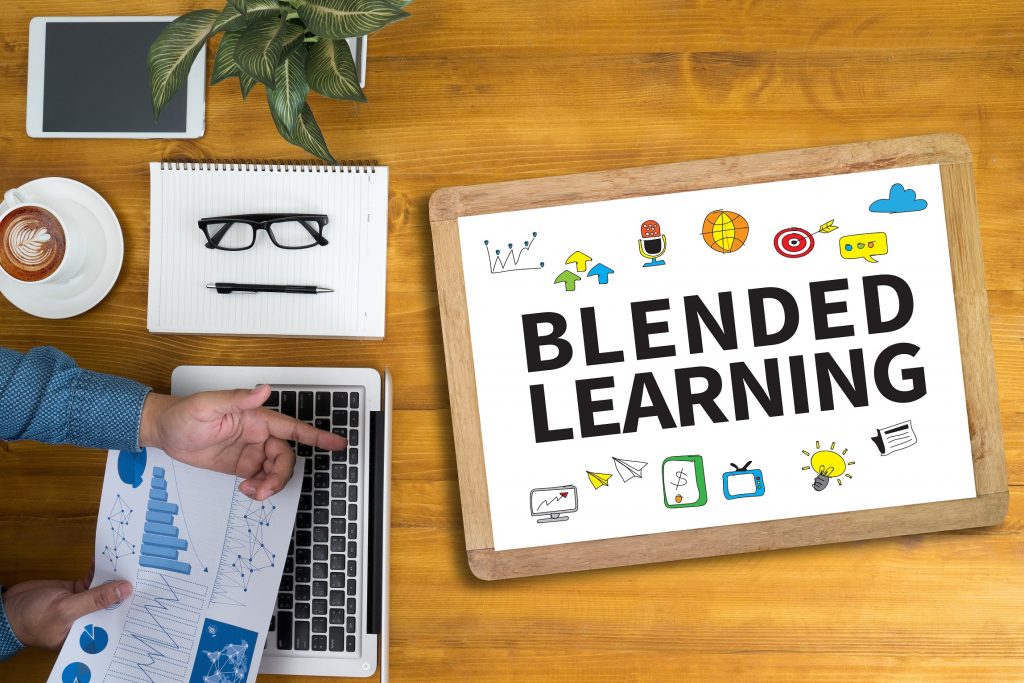How the Blended Learning concept refines Education*

What is Blended Learning?
Blended learning is live interaction between teacher and student that uses technology. This type of learning allows flexibility for students and teachers. Students can enjoy personalised learning that suits their study plan through blended tools. Teachers can interact with students more efficiently by monitoring their growth and giving instant feedback.
Blended learning allows students to personalise their learning experiences by using additional tools beyond the classroom. Learners can identify areas that need more attention and personalise their learning schedule to accommodate this. Teachers can also use blended learning methods to enhance their lessons. This is a modernised way of teaching that can have a positive impact on a student’s training experience.
This type of learning prepares students to work at digital based jobs that require technology proficiencies.
Through blended learning, institutions can create a balance between online education and face-to-face education. This encourages students to pursue the option of online courses that institutions offer. It is vital for students to choose a college that uses blended learning in their education programmes. By providing tech-driven student support, eco-space facilities, virtual-learning and other live streaming solutions. Through advanced online technology, students ends up having better knowledge and understanding of the qualification they are studying towards.
How does blended learning improve flexibility?
Through the technological innovations in blended learning, students can create flexible study plans.
Learners can adjust to custom learning styles which best suit them. Students can have improved interactions through effective electronic correspondence and they can track their progress or results on online platforms.
How does blended learning increase student interest?
Tech-based learning has been proven to increase the retention of students in classrooms or in online education. Blended learning methods involve tools that allow creativity in lessons and subjects. This keeps learners engaged and the use of online resources creatively recreates what they are learning.
This method of learning is not monotonous but it is always evolving to improve training. Lessons become interactive sessions that teachers and students look forward to and enjoy. Blended learning enables students to stay focused for longer which brings them academic success. Digital learning mechanisms can sustain the interest of students through graphics, videos and other methods. Teachers have the freedom to create instructional videos and give real-time feedback that promotes engagement with students.
Statistics reveal that there have been significant improvements in education through blended learning.
According to Centre for Digital Education’s (CDE) 2015 survey, blended learning has improved these areas:
- Student engagement increased by 69%
- Student retention rates rose by 39%
- Test scores improved by 28%
- Grade rates up by 22%
- Attendance increased by 22%
Allows teachers to build learning objectives
Blended learning allows teachers to design the content and structure of their lessons. Teachers can choose suitable tools for subjects so that the lessons are effective and meet the learning objectives.
Through blended tools, teachers have the freedom to create lessons that emphasise the desired focus point. This helps teachers to plan their lessons for each subject efficiently and ensure the best results.
Blended learning meets the organisation’s goals
The use of blended learning in universities will empower students to have suitable competencies for the workplace. The exposure to digital environments, platforms and devices equip students with skills that are required for their careers. Institutions can encourage blended learning methods to students through their curriculum. This will shape students for the digital expertise that’s required in the workplace.
One of our colleges that has adopted the blended learning concept is LCIBS (London College of International Business Studies). The college uses ‘technovation’ which is a blended learning method to transform the way education is received. The institution has innovative virtual learning and streaming solutions that enable students to share a classroom with a lecturer in London.
The institution has EcoSpace facilities that empower support to students across the globe. Students also gain practical and applicatory knowledge of their course content. They also offer innovation and entrepreneurship skills to students through their advanced technology.
*This article was wrote by Khanyie Dlamini and published in https://www.lcibs.co.uk/how-the-blended-learning-concept-refines-education/

